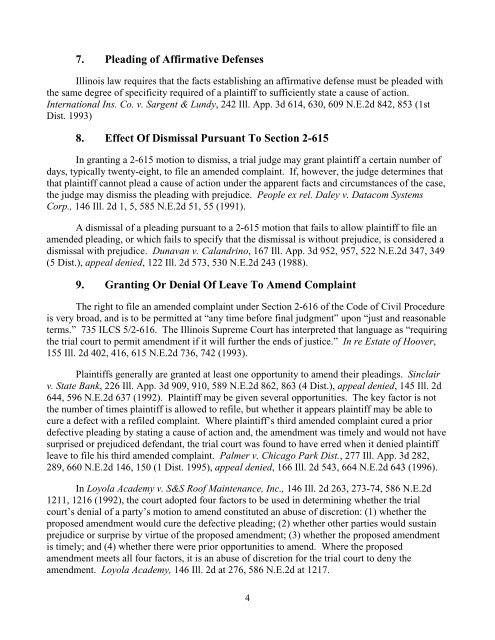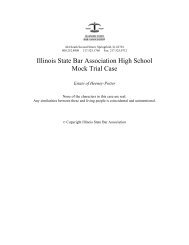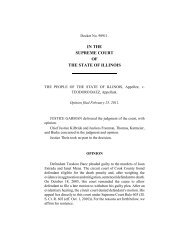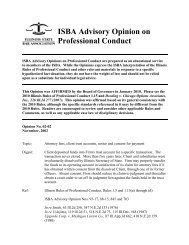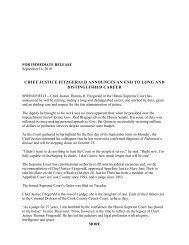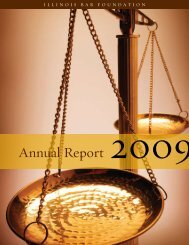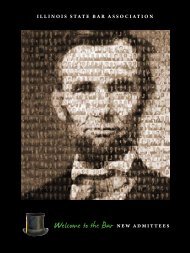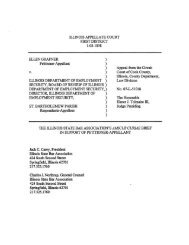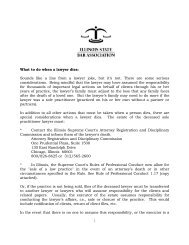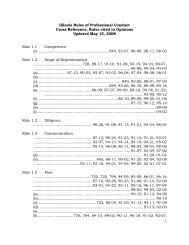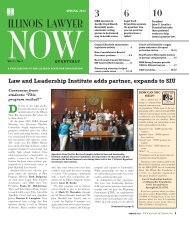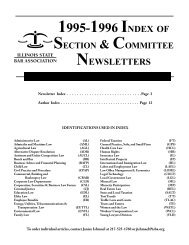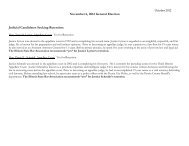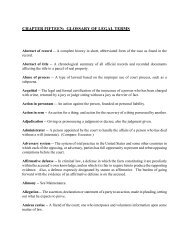MOTIONS TO DISMISS PURSUANT TO 735 ILCS 5/2-615 AND 2-619
MOTIONS TO DISMISS PURSUANT TO 735 ILCS 5/2-615 AND 2-619
MOTIONS TO DISMISS PURSUANT TO 735 ILCS 5/2-615 AND 2-619
You also want an ePaper? Increase the reach of your titles
YUMPU automatically turns print PDFs into web optimized ePapers that Google loves.
7. Pleading of Affirmative Defenses<br />
Illinois law requires that the facts establishing an affirmative defense must be pleaded with<br />
the same degree of specificity required of a plaintiff to sufficiently state a cause of action.<br />
International Ins. Co. v. Sargent & Lundy, 242 Ill. App. 3d 614, 630, 609 N.E.2d 842, 853 (1st<br />
Dist. 1993)<br />
8. Effect Of Dismissal Pursuant To Section 2-<strong>615</strong><br />
In granting a 2-<strong>615</strong> motion to dismiss, a trial judge may grant plaintiff a certain number of<br />
days, typically twenty-eight, to file an amended complaint. If, however, the judge determines that<br />
that plaintiff cannot plead a cause of action under the apparent facts and circumstances of the case,<br />
the judge may dismiss the pleading with prejudice. People ex rel. Daley v. Datacom Systems<br />
Corp., 146 Ill. 2d 1, 5, 585 N.E.2d 51, 55 (1991).<br />
A dismissal of a pleading pursuant to a 2-<strong>615</strong> motion that fails to allow plaintiff to file an<br />
amended pleading, or which fails to specify that the dismissal is without prejudice, is considered a<br />
dismissal with prejudice. Dunavan v. Calandrino, 167 Ill. App. 3d 952, 957, 522 N.E.2d 347, 349<br />
(5 Dist.), appeal denied, 122 Ill. 2d 573, 530 N.E.2d 243 (1988).<br />
9. Granting Or Denial Of Leave To Amend Complaint<br />
The right to file an amended complaint under Section 2-616 of the Code of Civil Procedure<br />
is very broad, and is to be permitted at “any time before final judgment” upon “just and reasonable<br />
terms.” <strong>735</strong> <strong>ILCS</strong> 5/2-616. The Illinois Supreme Court has interpreted that language as “requiring<br />
the trial court to permit amendment if it will further the ends of justice.” In re Estate of Hoover,<br />
155 Ill. 2d 402, 416, <strong>615</strong> N.E.2d 736, 742 (1993).<br />
Plaintiffs generally are granted at least one opportunity to amend their pleadings. Sinclair<br />
v. State Bank, 226 Ill. App. 3d 909, 910, 589 N.E.2d 862, 863 (4 Dist.), appeal denied, 145 Ill. 2d<br />
644, 596 N.E.2d 637 (1992). Plaintiff may be given several opportunities. The key factor is not<br />
the number of times plaintiff is allowed to refile, but whether it appears plaintiff may be able to<br />
cure a defect with a refiled complaint. Where plaintiff’s third amended complaint cured a prior<br />
defective pleading by stating a cause of action and, the amendment was timely and would not have<br />
surprised or prejudiced defendant, the trial court was found to have erred when it denied plaintiff<br />
leave to file his third amended complaint. Palmer v. Chicago Park Dist., 277 Ill. App. 3d 282,<br />
289, 660 N.E.2d 146, 150 (1 Dist. 1995), appeal denied, 166 Ill. 2d 543, 664 N.E.2d 643 (1996).<br />
In Loyola Academy v. S&S Roof Maintenance, Inc., 146 Ill. 2d 263, 273-74, 586 N.E.2d<br />
1211, 1216 (1992), the court adopted four factors to be used in determining whether the trial<br />
court’s denial of a party’s motion to amend constituted an abuse of discretion: (1) whether the<br />
proposed amendment would cure the defective pleading; (2) whether other parties would sustain<br />
prejudice or surprise by virtue of the proposed amendment; (3) whether the proposed amendment<br />
is timely; and (4) whether there were prior opportunities to amend. Where the proposed<br />
amendment meets all four factors, it is an abuse of discretion for the trial court to deny the<br />
amendment. Loyola Academy, 146 Ill. 2d at 276, 586 N.E.2d at 1217.<br />
4


